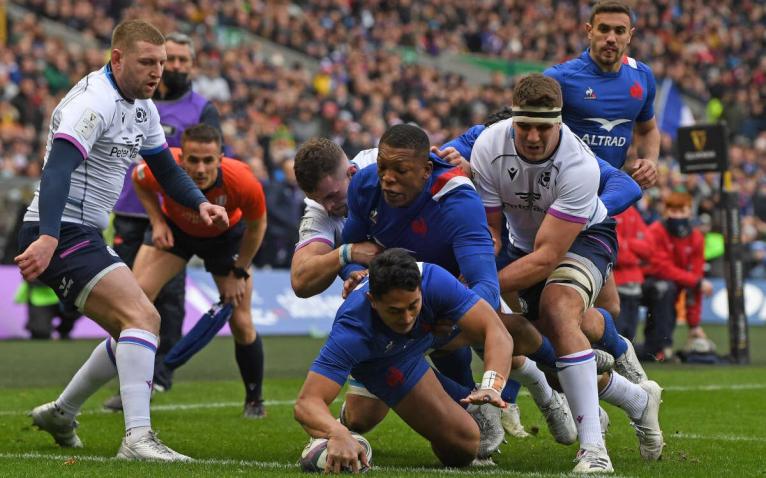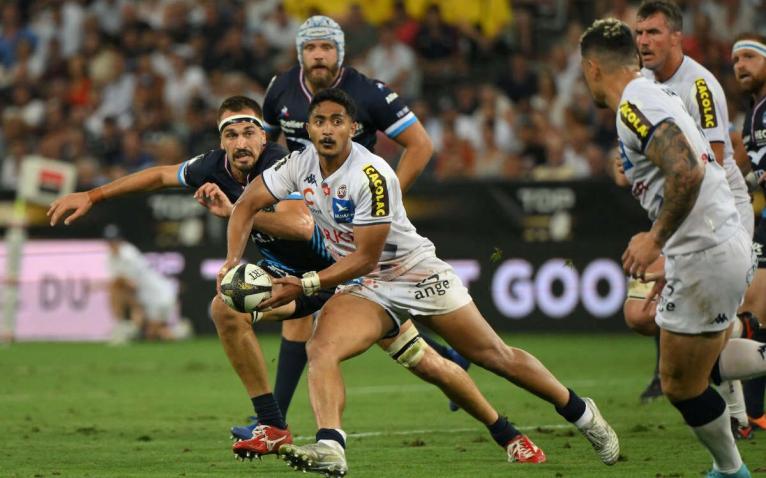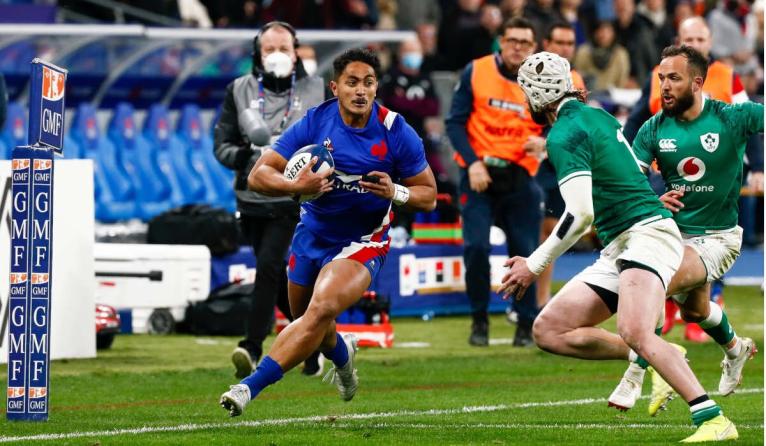While Ireland have been achieving greatness in New Zealand this month, and England grafting out a series victory in Australia, France slipped in and out of Japan largely unnoticed by the Anglophone rugby media.
Les Bleus won the two Test series, a success that lifted them to No1 in the world rankings, a first for them since the system was introduced, and which extended to ten their winning streak. Beat Australia in the Stade de France in November and Fabien Galthié,’s side will become the first French XV to string together eleven wins on the bounce.
The tour to Japan was a useful exercise for Galthié, who left at home players from Top 14 finalists Montpellier and Castres, as well as half a dozen of his Six Nations regulars who he judged were in need of a rest.
That was an opportunity for some of the lesser lights to shine, and none beamed as brightly as
Yoram Moefana, the 22-year-old Bordeaux centre who has now started five of those ten victories. ‘His potential is clear,’ said Galthié, when he handed Moefana his Six Nations’ debut against Italy in February. ‘Technically, physically and psychologically, not to mention his talent, he is ready to meet all the requirements of this game.’
Moefana is a journalist’s dream; there is so much to say about him, unlike many modern players who come through the academies and have little of interest in their back story.
Take the first Test in Tokyo; it’s not often that a player lines up alongside his uncle, but that was what Moefana did, singing the Marseillaise alongside 25-year-old Clermont prop Sipili Falatea. It was the first time that an uncle and nephew have appeared together in a Test match, and it’s a pub quiz question for the ages.

Moefana was born in Futuna, a French Overseas Collectivity in the South Pacific with a 10,000 population, approximately halfway between Fiji to the south-west and Samoa to the north-east.
New Zealand is nearly 2,000 miles south, and it was there that Moefana first saw France in action, losing 37-17 to the All Blacks at Eden Park in a pool match of the 2011 RWC
It was a trip organised through his college but at the time Moefana ‘played rugby only for fun’ and if he did have a hero it was Jonah Lomu.
Two years later, at the age of 13, Moefana did what many young Islanders did and headed to the other side of the world, swapping the sultry heat of the South Pacific for the bitter cold of France. ‘I arrived at the start of 2013,’ recalled Moefana. ‘It was snowing… I went from a place where it was 25-30 (degree Celsius) to another where it was 5-10 (degree Celsius).’
He arrived with his uncle, Tapu Falatea (the older brother of Sipili), a 6ft 2in and 21stone prop whose ambition was to make it as a professional rugby player. Falatea realised his dream, starting his career at Limoges before becoming a pro with Colomiers, then Castres and now Agen.
Moefana is easy to manage because he knows where he wants to go and what he must do to get there. He is a learner, always reliable, but surprising, too because he is as reserved, even shy, in life as he is aggressive on the pitch
Christophe Urios, Bordeaux head coach
His young nephew had no such dreams when he arrived in France, but the Limoges youth academy saw from the start that Moefana had a rare talent. He followed his uncle to Colomiers, the ProD2 club on the outskirts of Toulouse, playing a few times for their academy in 2017-18. The following season Moefana made his senior debut, playing six times for Colomiers; it was enough for Bordeaux to swoop.
Moefana signed for the club in the summer of 2019, just as Christophe Urios was appointed director of rugby. ‘He’s a dynamo,’ declared Urios last season. ‘And he’s easy to manage because he knows where he wants to go and what he must do to get there. He is a learner, always reliable, but surprising, too. Because he is as reserved, even shy, in life as he is aggressive on the pitch.’
One of Moefana’s mentors at Bordeaux in his early days at the club was their veteran centre, Jean-Baptiste Dubié. ‘He’s a lovely bloke,’ he said recently. ‘He has a lot of values, listens and wants to progress.’

Moefana has been lavished with rugby talent, and physique, but it’s his character that is always singled out first by coaches and teammates. He’s conscientious, diligent and driven: a coach’s dream, as Urios mentioned.
Dubié also highlighted Moefana’s ‘vision of the game’, his ability to read a situation a split second faster than most players. All these factors explain why Fabien Galthié took a punt on Moefana when he selected him in his XV for the Autumn Nations Cup in November 2020. No one was more shocked than Moefana. ‘In fact, when I got the call that I was selected, I could hardly believe it,’ he said. ‘After the phone call, I was running around wondering if it was true.’
In winning his first cap against Italy, Moefana became the first player born in the 21st Century to play for France. The man’s a walking pub quiz.
He’s 6ft and 15 and a half stone, by modern standards not a man of monstrous proportions, but Moefana is a powerful, balanced runner with a low centre of gravity and an electric acceleration.
At the time the 20-year-old had made only five Top 14 appearances for Bordeaux, but he’d scored tries in four of them. He’s 6ft and 15 and a half stone, by modern standards not a man of monstrous proportions, but Moefana is a powerful, balanced runner with a low centre of gravity and an electric acceleration.
Galthie paired him alongside Jonathan Danty in the Autumn Nations Cup final against England. Eddie Jones side, boasting more than 800 caps, had been expected to make short work of a callow French XV with a grand total of 68 caps, but England needed extra-time to eek out a victory at Twickenham.
As is often the way after the pleasure came the pain, and the 2020-21 season was a bit of a write-off for Moefana. Two ankle injuries disrupted his season and he failed to win any more caps, or even demonstrate much that his development was continuing apace; but, as befits a man who likes to keep busy, the injury at least allowed him to focus on the marketing degree for which he is studying.

His return to action has been spectacular, for club and country, and in Japan he demonstrated his attacking qualities in the first Test, scoring a wonderful try from just inside the Japanese half; it combined all his talents: the vision to see the space behind the defence, the skill to execute a perfectly weighted chip kick, the pace to beat the Japanese winger to the ball and the power to drive through a cover tackle and over the line. He made a second try with a powerful burst through the midfield in a performance that earned him the Man of the Match award.
While the midfield is the glaring weakness in the England XV, for Fabien Galthié who to pick as his centre pairing will be an enjoyable conundrum such are the options
The second Test was more about defence, his self-confessed weakness, but Moefana pulled off one try-saving hit that showed his improvement.
While the midfield is the glaring weakness in the England XV, for Fabien Galthié who to pick as his centre pairing will be an enjoyable conundrum such are the options. Gaël Fickou, the defence captain, would appear to be inked in, and then it’s a tussle between Moefana, Danty and Virimi Vakatawa, who partnered Moefana in Japan.
Moefana and Vakatawa share more than just a similar playing style; they are also introverts, happiest away from the spotlight. ‘He’s a bit of a loner, said Christophe Urios of Moefana last month. ‘Even in one-to-one chats, it’s the same, he doesn’t talk much. It’s “yes”, “no”, “maybe”, “we’ll see”. He is not a boy who opens up.’
Not that Urios is bothered. ‘His means of expression and his way of expressing himself,’ he told reporters, ‘they are on the pitch.’


Comments
Join free and tell us what you really think!
Sign up for free